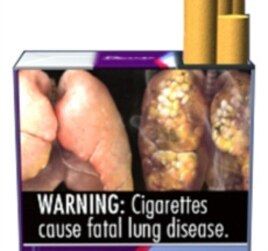15 May, 2016
The tobacco industry in India is fighting a new government rule for cigarette containers, or packages. The new rule requires cigarette makers to print large warnings that include images, on cigarette packages.
Those in the tobacco industry say the measure will hurt the business of more than 45 million farmers. They also say it will lead to an increase in the sale of illegal cigarettes.
Health officials say tobacco causes about 1 million deaths a year in India.
The government has ordered manufacturers to cover 85 percent of the front and back of cigarette packages with images -- such as diseased lungs. The images are designed to discourage smoking.

A cigarette warning showing a healthy lung and one diseased from smoking.
Current Indian law requires warnings on 40 percent of just the front of the packages.
Earlier this week, India's Supreme Court ruled against a request to stop the new rule from going into effect. The government announced the new rule on April 1.
The court ordered tobacco companies to obey the new rule.
However, the court also directed a lower court to hear more than 25 petitions from big tobacco companies. These petitions are in different courts and dispute the new guidelines.
One point-of-view: Tobacco industry
Representatives from the tobacco industry feel hopeful about the petitions in the fight over the rule. The Tobacco Institute of India represents large tobacco companies, such as ITC and Godfrey Philips. The group placed large advertisements in newspapers the day after the court ruled.
The advertisements note that the United States does not require such picture warnings. The ads also state that current warnings, such as the words "Smoking Kills," are enough to discourage people from smoking.
The Institute says that the more severe warnings will lead to an increase in the sale of illegal cigarettes. These illegal cigarettes come from countries that do not have such severe rules about warning labels.
Tens of thousands of tobacco sellers and farmers are also protesting the new rules. They say they are worried about the effects the new warnings will have on tobacco sales.
Chengal Reddy is head of the Federation of Farmers Association in India. He told VOA that farmers are not opposed to reducing tobacco crops. However, Reddy says, farmers need something else to plant.
"As a farmer, I am not in a position to do research and go into policy issues. It is the responsibility of the government. When they say a crop is bad, they should show me alternatives. That is their responsibility."
India is among the world's top tobacco producers. Tobacco plants grow well throughout several states in India. Farmers are threatening to increase their protests.
Another point-of-view: Health advocates
Health advocates in India say they are happy with the ruling. They have long pushed for stronger warnings on packaging.
Half of the population in India is under the age of 25. And many people cannot read. As a result, health advocates believe the images may work better than words of warning.
Discouraging the use of tobacco
India has taken many steps to discourage the use of tobacco. Last year India raised taxes on tobacco products. And in April, the Indian capital New Delhi banned the sale of chewable tobacco. Chewable tobacco can cause mouth cancer. India has banned advertisements of tobacco products. It also banned smoking in public although that law is not enforced.
A World Health Organization study says tobacco-related diseases cost India about $22 billion in 2011.
I'm Anna Matteo.
Anjana Pasricha reported this story from India for VOA News. Anna Matteo adapted it for Learning English. Caty Weaver was the editor.
___________________________________________________________
Words in This Story
discourage – v. to try to make people not want to do (something)
petition – n. a formal written request made to an official person or organization
advertisement – n. something that is shown or presented to the public to help sell a product or to make an announcement
alternative – n. something that can be chosen instead of something else : a choice or option
advocate – n. a person who works for a cause or group